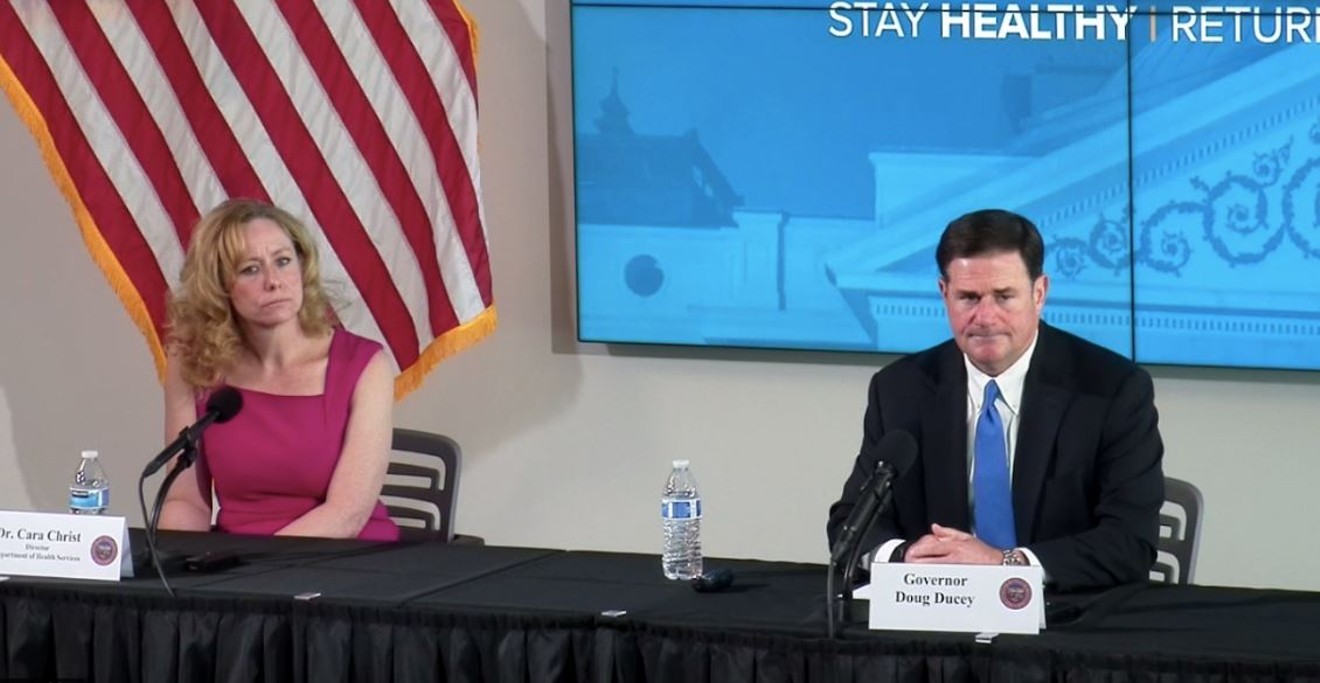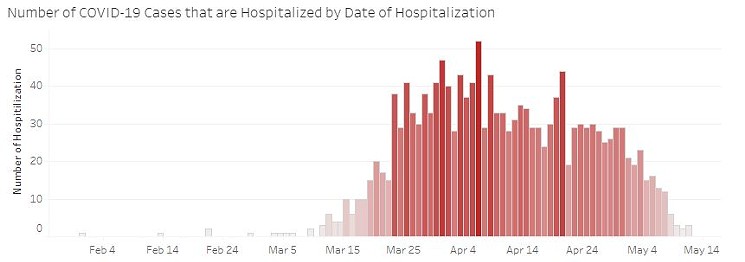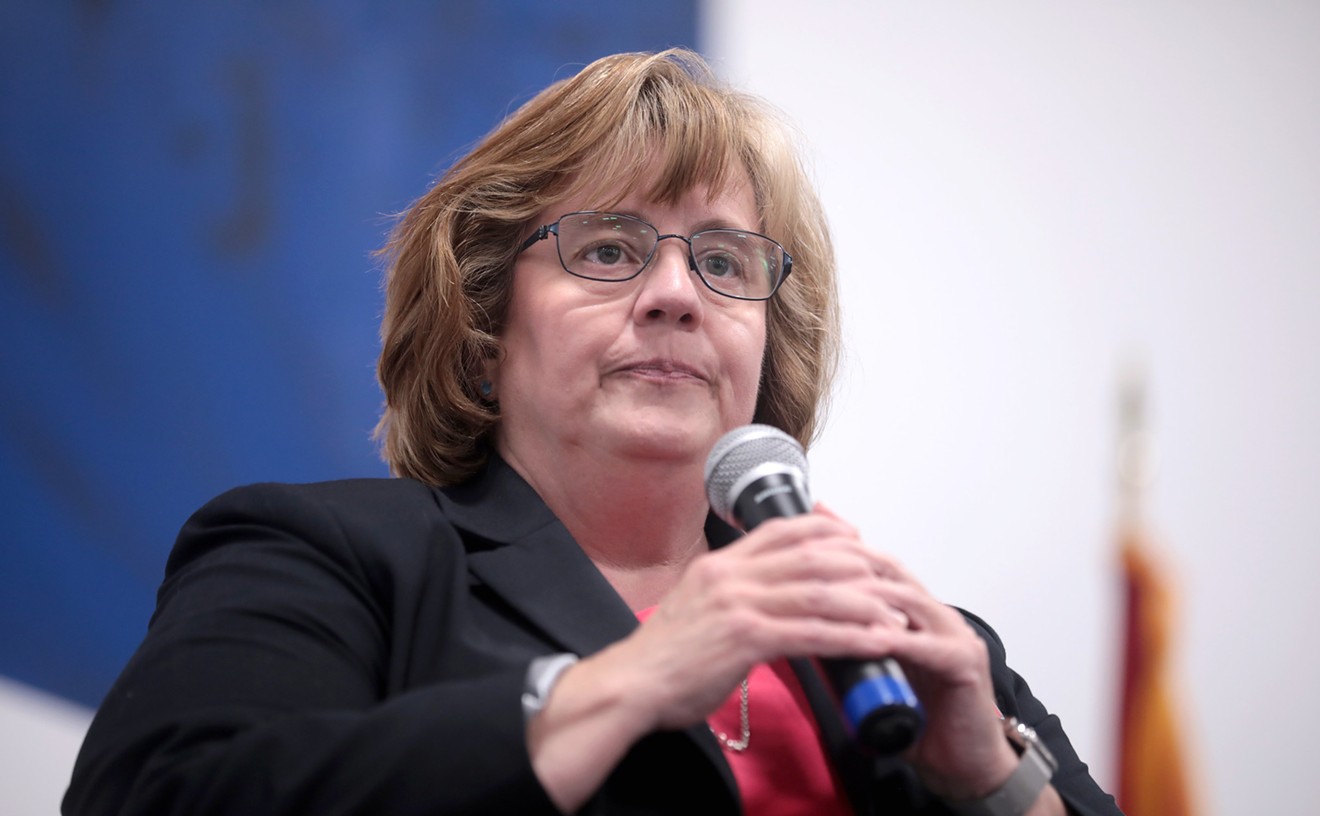Arizona Governor Doug Ducey on Tuesday gave the state a "green light" to reopen businesses, albeit carefully, saying that statistics show "we are clearly on the other side of this pandemic."
Flanked by state health director Dr. Cara Christ and the state's emergency manager, Major General Michael McGuire, Ducey said he would let his "Stay at Home/Stay Healthy" order expire on May 15. He had already extended it once, from April 30.
Starting tomorrow, the governor said, pools, gyms, and spas can reopen with appropriate social distancing measures. In an effort to boost the state's devastated economy, Ducey previously had announced on May 4 that restaurant dine-in service could begin again, and that barbers and beauty salons could reopen.
"This does not mean a return to normal," Ducey cautioned in today's announcement. "This is the next step forward on the way out of this pandemic."
The new policy "aligns with gating criteria issued by the White House and Centers for Disease Control and Prevention (CDC)," according to the governor's website, which published extensive new information and advice today (see below) about the best practices to ensure everyone's safety and keep infection rates low.
Ducey said people working from home now "are welcome" to return to work, but they don't have to, and he recommended that if they could continue to work from home, they should do so.
In a new executive order Ducey issued today about the plan, businesses are told they "shall develop, establish, and implement" policies to slow the spread of the coronavirus based on guidance from government agencies.
Enforcement of the new policy is bound to be spotty. The order doesn't say if the plans should be submitted anywhere, or what might happen if businesses don't make a plan, or make a bad plan.
Many Arizonans have no interest in more rules. At least three sheriffs of Arizona's 15 counties publicly stated two weeks ago that they won't enforce distancing or lockdown orders, and several — if not many — businesses in Phoenix have begun to openly flout the state's orders, often under the direction of conservative groups that pressed for a faster reopening.
Only a handful of citations have been issued in the Phoenix area — which is how Ducey wants it. The new restaurant provisions that went into effect this week have been interpreted loosely by some businesses, including downtown Tempe bars that drew crowds of Arizona State University students celebrating their graduation on Monday. In response, Tempe sent out a few officers who tried to reduce crowd sizes and educate people about social distancing. At the news conference, Ducey thanked Tempe police for taking "the posture of having a lighter touch."
Late Tuesday afternoon, however, Tempe Mayor Mark Mitchell issued a proclamation ordering bars and restaurants to file their social-distancing plans with the city, and said he expects police to issue citations if businesses don't adhere to warnings.
“This did not meet my expectations for what it looks like to reopen safely and responsibly,” Mitchell said of the photographs of densely packed ASU students at local bars.
Following Ducey's announcement, the city of Phoenix also announced that it would present the City Council with a reopening plan for public pools, but it would take at least 30 days to open the pools following any Council decision.
Paul Diefenderfer, owner of the Phoenix Rock Gym in Tempe, said he planned to open his gym as soon as Saturday. Patrons would be responsible for using hand sanitizer and washing their hands.
"We're going to survive," he said, noting that the climbing gym has been closed for 52 days. "It has been financially painful."
Ducey's latest move comes as President Trump has pushed for states to reopen sooner, as demonstrators have stormed the State Capitol demanding an end to the lockdown, and as governors in several other states have taken steps to get their economies back in gear. In California, Governor Gavin Newsom also lifted some restrictions today even as the top health official in Los Angeles County braced residents for three more months of lockdown.
While some Arizonans cheered Ducey's latest decision, others expressed horror. Typical for the times, opinions ran along partisan lines.
"And how do we have a downward trajectory of covid-like illnesses?" Democratic State Representative Kirsten Engel tweeted about the new policies. She attached a graph from the Arizona Department of Health Services information dashboard showing no obvious downward or upward slope of incoming hospital patients with COVID-19. "Doesn't look like it's going down to me. What am I missing?"
Before the 3 p.m. news conference, demonstrators with the left-wing group Indivisible Phoenix held a demonstration at the Capitol to protest a quick reopening, laying out body bags as props.
Journalists at the event also questioned the statistics. Ducey and Christ explained that the state's recent "testing blitz" has resulted in more known cases, but that statistic doesn't mean the pandemic is growing in Arizona.
When a reporter noted that the number of hospitalizations and deaths due to COVID-19 are still "high," Ducey said the data shows that the rate of deaths and coronavirus hospitalizations is "steady if not flat."
Christ acknowledged that officials don't know if infections of the deadly disease have peaked, but that the state would "wait and see."
A couple of websites with predictive models show that the state could increase its number of coronavirus cases and deaths without overwhelming the health care system. For instance, COVID ACT NOW reports that as of May 11, Arizona coronavirus patients occupy 27 percent of available hospital beds. The Institute for Health Metrics and Evaluation site also shows the number of hospital beds and intensive care unit beds isn't likely to be exceeded in coming weeks.
Since the state's first known coronavirus case in late January, Arizona has seen a total of 11,736 confirmed cases, state data from May 12 shows. The actual number of cases is believed to be larger, but testing in the state still lags. At least 562 people have died of the disease.
The latest figures give the state a relatively low per-capita fatality rate of 7.82 per 100,000 residents. About half of U.S. states have current per-capita COVID-19 death rates of less than 10. The problem is much larger in about a dozen states, including Connecticut and New York, which have estimated per-capita coronavirus death rates of 83 and 137, respectively. The Navajo Nation, by comparison, lists a total of 102 deaths for its population of 174,000, giving it one of the highest per-capita rates in the country. During Tuesday's news conference, Major General McGuire briefly listed some ways the state is helping the country's largest Indian reservation deal with the crisis.
Ducey also addressed the problem of some Arizonans not getting their unemployment checks, saying the state system had been "overwhelmed" and that eligible people would be reimbursed retroactively for all they are due.
On the subject of nursing homes and long-term care facilities, Ducey again resisted the idea from some reporters that the state needs to release data on the specific care homes reporting coronavirus cases. Repeating that his grandmother is in such a facility, Ducey said that residents of nursing homes and families of residents are being notified when the facilities register an outbreak. If someone wants to move a loved one into a facility, Ducey said, the family would find out if the facility has had an outbreak — but only after the facility approves the move-in.
Read:
New executive order
New guidance for pools
New guidance for gyms
New guidance for places of worship
New guidance for spas, massage therapists, and personal services
[
{
"name": "Air - MediumRectangle - Inline Content - Mobile Display Size",
"component": "18478561",
"insertPoint": "2",
"requiredCountToDisplay": "2"
},{
"name": "Editor Picks",
"component": "16759093",
"insertPoint": "4",
"requiredCountToDisplay": "1"
},{
"name": "Inline Links",
"component": "17980324",
"insertPoint": "8th",
"startingPoint": 8,
"requiredCountToDisplay": "7",
"maxInsertions": 25
},{
"name": "Air - MediumRectangle - Combo - Inline Content",
"component": "16759092",
"insertPoint": "8th",
"startingPoint": 8,
"requiredCountToDisplay": "7",
"maxInsertions": 25
},{
"name": "Inline Links",
"component": "17980324",
"insertPoint": "8th",
"startingPoint": 12,
"requiredCountToDisplay": "11",
"maxInsertions": 24
},{
"name": "Air - Leaderboard Tower - Combo - Inline Content",
"component": "16759094",
"insertPoint": "8th",
"startingPoint": 12,
"requiredCountToDisplay": "11",
"maxInsertions": 24
}
]













